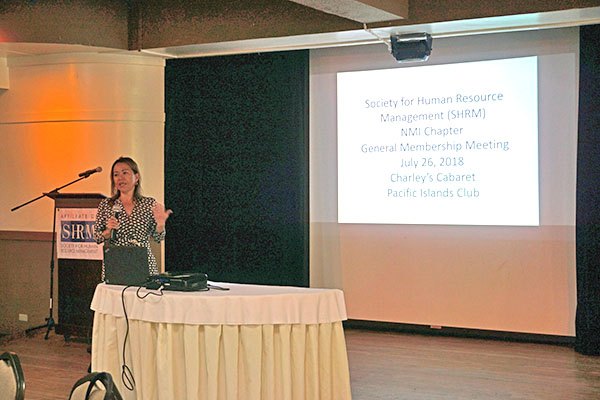Employers urged to help OAG Child Support Office
New law automatically garnishes employees for child support

Assistant Attorney General Barbara Cepeda of the OAG Child Support Office talks about the New Hire Law to members of the Society of Human Resources Management during their membership meeting held yesterday at Charley’s at the Pacific Islands Club Saipan in San Antonio. (Bea Cabrera)
Public Law 20-60 was signed into law by Gov. Ralph DLG Torres last June 14, 2018 to establish a State Directory of New Hires. The law requires employers to report to the CNMI Office of the Attorney General Child Support Office all newly-hired employees regardless of age, race, religious beliefs and status mainly who are under the responsibility to fulfill child support duties.
Speaking in front of the Society for Human Resource Management general membership meeting yesterday at Charley’s in Pacific Islands Club, assistant attorney general Barbara “Bobbie” Cepeda said that P. L. 20-60, or the New Hire Law, was passed mainly for child support.
“In 1997, (United States) Congress required all the 50 states and the territories that have federally funded child support programs to have the New Hire Law. The reason why we didn’t have to do it was because we didn’t have a federally funded program in the CNMI…we are not just passing this law so we can have federal funds. We are passing laws because it helps us.”
“It helps us to collect child support from people who owe. The fact that we have federal funds to do it is icing on the cake. But the main reason why we are doing this is to help the child support program, help get money to the children, and passing this law is definitely going to do that,” she added.
Cepeda believes that employers play a very vital role in the financial support of children “The checks get to the children through the employers. If the non-custodial parent is working in your office and we sent a wage withholding order the amount stated in the order is deducted and the check is sent that eventually gets to the child,” she said.
“So we are really going to be close partners in this and we appreciate the work that employers do to make sure that children get the financial support that they deserve,” she added.
The information gathered from employers under the New Hire Law will be used to locate the non-custodial parent.
“There are times that the person who should pay for child support are working but we don’t know about it. We at the Office of the Attorney Generals Child Support Office don’t know where to locate the non-custodial parent therefore no money is coming in. No money is being deducted and the arrears or delinquent amount adds up every month until we find the person.” Cepeda said.
“With the New Hire Law, we would be able to find out sooner whether or not a person is working rather than years down the road. So we use that information to locate, establish a child support order and since the law was passed, we’ve actually found people already. This allowed us to bring the case back to court and to get that parent who owe to start paying and provide child support,” Cepeda added.
Cepeda said that every information they get remains confidential. “We are not allowed to share with just anyone. But we are allowed to share it to the Department of Labor to track unemployment or workers compensation fraud. We are allowed to share it with Department of Community and Cultural Affairs office to track food stamp fraud.”
“At the Attorney General’s Office, it is only the people in the Child Support Office who have access to the information and even those people who have access can only use it only for child support purposes,” she added.
Under the New Hire Law, employers have to report when they hire or rehire an individual within 20 calendar days from date of hire or rehire. “The days are short so the information is current with us. If we say 90 days by that time maybe the person has quit working and we lose track of them and not be able to locate them. We won’t be able to collect child support because the information is stale,” Cepeda said.
“The New Hire Law also requires employers to report within 90 days from when law was passed a list of all its current employees. When the employee quits, the employer has to report that information again to the Office of the Attorney General not later than the 10th day of each month as this would help us get the person who stops paying child support back to court to pay his child support or have the judge order him to get a job or do something,” she added.
Cepeda said that the Office of the Attorney General Child Support Office also enforces an existing order. “It’s not only our order that we enforce but we enforce the order from the 50 states. If they sent us an order from the Washington State…we would take that order and register it.”
“We will enforce it by sending a Wage Withholding Order to employer to start deducting the required amount,” Cepeda added.
Reporting on the part of the employers is made by filling up W-4 or W-9 forms and they are available on-line: cnmioag.org. Submission of reports can be in person to the in 2/F Juan Sablan Memorial Building Capitol Hill, by mail addressed to Caller Box 10007 Capitol Hill, e-mail: new_hire@cnmioag.org or by sending thru fax (670) 664-2349
“In case of multi-state employers, employers can opt to report in one place as long as we inform the Secretary of the Department of Health and Human Services so they know where the reports are going,” Cepeda said.
“If employers do not send a report, our office will send a notice of non-compliance. We will closely monitor and if the employer continues non-compliance with the law then it’s a $25 for each unreported employee. If there’s a conspiracy between the employer and employee not to report, they face a $500 fine,” Cepeda added.
The New Hire Law is implemented simultaneously with the Income Withholding Orders where employers are required to deduct an amount from an employee who has child support obligations.
“Employers have 14 days after being served with the order to implement this. The amount limit is no more than 50 percent of obligor’s disposable income which means earning remaining after deductions,” Cepeda said.
“Pay withheld is sent to the Superior Court within seven business days… IWO has priority over other garnishments, attachments, wage attachments, etc.,” Cepeda added.



























